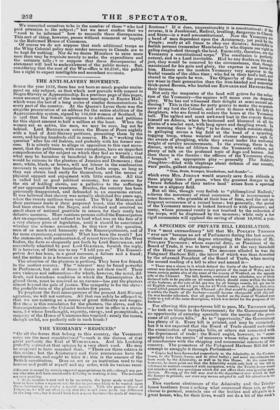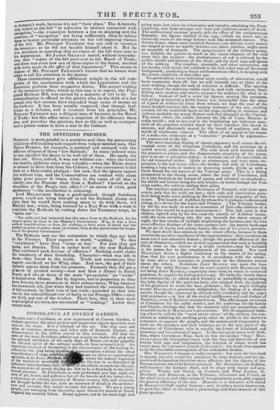A SPECIMEN OF PRIVATE BILL LEGISLATION.
THE " most extraordinary" bill that Mr. POULETT THOMSON " ever saw" became an act of Parliament during the last session, without in the slightest degree attracting the attention of Mr. PouLarr THOMSON ; whose especial duty, as President of the Board of Trade, it was to have stopped it at the very threshold of the House of Commons. The measure alluded to was the Fishguard Harbour Bill ; the intent of which was thus described by the aforesaid President of the Board of Trade, when moving the second reading of a bill to alter and amend it- " There was a clause in it which defined the limits of the harbour; and its extent was declared to be between certain points of the coast of Wales, and be- tween certain points also of the coast of the county of Wexford, on the opposite side of the Channel. The hill, besides, contained two schedules, one of which declared tolls to be payable on all vessels which should come within the limits of the harbour, at the rate of 3d. per ton for all foreign vessels, 3d. per ton for all English vessels, and Ii!. per ton fur all Welsh vessels; so that, inflict, every vessel which passed through the Channel—for that would be sufficient to bring it within the limits of the harbour—would become chargeable with this toll. Ile was besides informed, that all goods landed on the coast of Wexford were liable to a toll of the same description, which was levied for the purposes of the harbour."
For allowing this preposterous bill to pass, Mr. Thomson said, " he took no blame to the Government; for the Government had no opportunity of entering specially into the merits of the provi- sions of all private bills." As to " opportunity," the Government has plenty of it. Every bill is printed, and may be examined; but it is nut expected that the Board of Trade should undertake the examination of turnpike bills, or others not connected with the department of trade : the Board ought, however, to " enter specially into the merits" of measures whose titles give warning of interference with the shipping and commercial interests of the country. The promoters of the Fisliguard Harbour 13111 did not attempt to smuggle it through Parliament- " Copies had been forwarded respectively to the Admiralty, to the Co:tom- house, to the Trinity-house, and to other bodies ; and some amendments had been made by the Admiralty, as well as by this House. At the Klme tinX, however, lie must point out that the Admiralty would only look at the bill in reference to matters connected with navigation, while the Trinity.house would not interfere with any provisions which did not affect their own peculiar pans diction. No copy of the bill was sent to the department over whieh lie had the honour to preside, nor were any means adopted to call his attention to the matter."
This cautious abstinence of the Admiralty and the Trinity house brethren from teuching what concerned them not, as they choose to pretend, reminds one of the butlers and abigails great house, who, for their lives, would not du a bit of the cook s or footman's work, because it is not " their place." The Admiralty only looked at the bill " in reference to matters connected with eangation,"—the connexion between a tax on shipping and the interests of "navigation" not being sufficiently close to induce them to bestow particular attention on the toll-imposing clauses of the bill. Mr. POULETT THOMSON was not told to examine the measure ; so he did not trouble himself about it. But he was mistaken in asserting that no copies of the bill were sent to his department. Sir JAMES GRAHAM stated, without contradic- tion, that " copies of the bill were sent to the Board of Trade; and there was even now one of those copies in the house, marked with notes made in the ogee of that department." This seems to dispose of Mr. Poneerr THOMSON'S excuse that no means were taken to call his attention to the matter. These circumstances give additional weight to the old com- plaints of the carelessness with which the Legislature and the Executive perform their respective duties. The second reading of the measure to alter, which in this case is to repeal, the Fish- guard Harbour Bill, was carried by a majority of 181 to 20. No indemnification is offered to the parties who, on the faith of a law passed only last session, have expended large sums of money on the harbour. It has been usually supposed, that though inef- ficient as a debater, and a recreant from his principles, Mr. POULETT THOMSON was a diligent man of business in the Board of Trade: but this affair raises a suspicion of his efficiency there also, and provokes the question, how so idle as well as unimpor- tant a person comes to have a seat in the Cabinet.



























 Previous page
Previous page